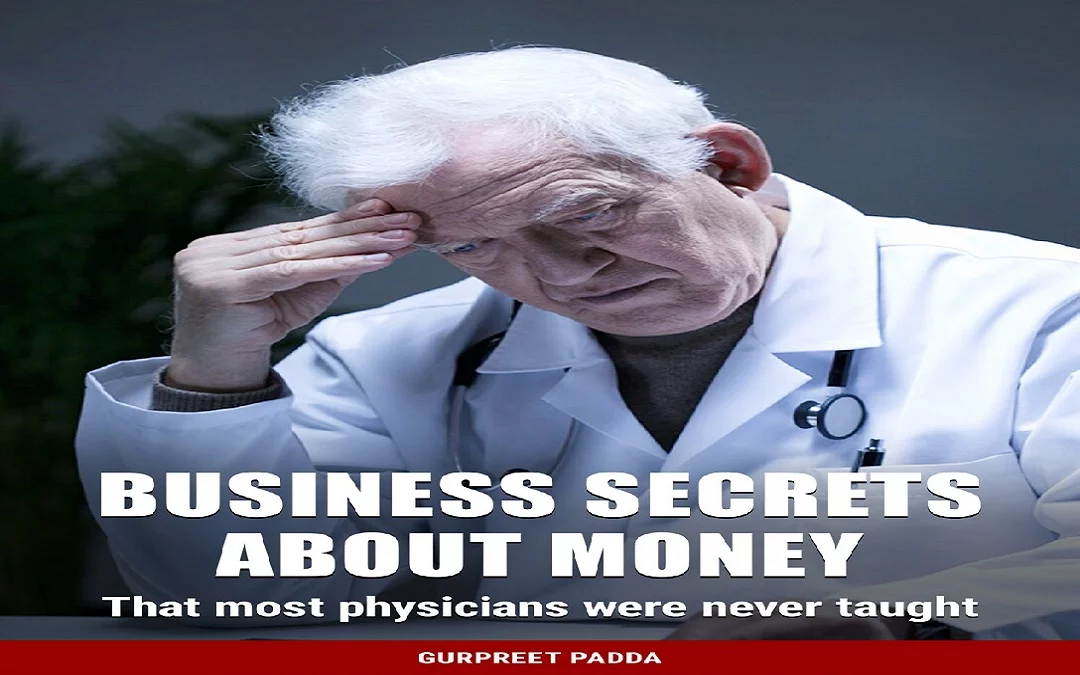As Doctors, We Were Never Taught Anything About Money In Medical School. We Have Been Purposely Kept In The Dark, While All Of The People Around Us Are Working Less And Becoming More Wealthy.
Most doctors make a decent living, but that doesn’t mean they are wealthy. Physician salaries and income may be high, but their expenses are also high. If you stopped working today, how many months would you have, before you ran out of money?
Just because we are doctors, doesn’t mean we can’t get seriously injured or sick.
If You Suddenly Couldn’t Work Due To An Accident:
How many months would you have, before you had to move to a cheaper house?
How many months would you have, before you started to deplete your savings?
Did you know that disability insurance doesn’t cover your full income, and unreimbursed medical expenses bankrupt the families of most physicians?
Have you anticipated an additional $285, 000 in medical expenses?
Have you anticipated spending $128, 000 a year for the next 10 to 20 years if you have to go into a nursing home facility?
If Any Of Those Questions Scare You…
Consider this your wake-up call, your chance to take control of your own future.
Physicians today face huge challenges in a rapidly changing healthcare environment:
Declining
Regulation and compliance
Evermore patient demands and never enough time to help
It’s no wonder the burnout rate is so high.
How Are We Supposed To Help Our Patients When We Are Struggling With Our Own Financial Well-Being?
Do something about it!
As A Physician, The Last Thing I Thought I Would Have To Worry About Was Money.
I don’t know why, but I really thought having a 401K and investing in the stock market would let me retire wealthy. I was seriously mistaken. Blindly trusting my money to stockbrokers, promising an 8-10% return, does not actually lead to financial freedom.
As physicians, we assumed that if we simply took care of our patients, we would make more than enough money and that we would never have to worry about money. That eventually when we retired, we would retire with freedom and the resources to enjoy it.
We assumed that by doing good for others, we ourselves would be rewarded.
We assumed that because we have a high salary, we would never run out of money.
Most of us grew up thinking that even talking about money was a bad thing.
Most of us grew up thinking that even talking about money was a bad thing.
Unfortunately, we have ignored our financial education, to our peril.
We trusted in our financial advisers, to guide us in saving for our eventual retirement goals, but in reality, we are putting money into their pockets and they really have nothing to lose. They charge us a fee, whether they make money or not, and if we lose everything, they lose nothing.
Our hospital administrators, our governmental officials, our financial advisers, even our gas station and dry cleaner owners have more wealth and time freedom than we do.
The system is rigged against us. We get taxed at the highest levels and have nothing left to show for it.
At the end of the day, most physicians end up dying broke and broken.
Did You Know About 10,000 People Retire Each Day In The U.S.?
That’s about 300,000 people per month.
Almost 40 million households have no retirement savings at all, according to the National Institute on Retirement Security.
Close to two-thirds of seniors cite finances as the primary reason why they remain at work, according to a recent poll by Provision Living, a provider of senior living communities.
The Problem Is That:
One year of nursing home care, in a semiprivate room is projected to be $128,100 in
A 65-year-old couple retiring in 2019 can expect to spend $285,000 on healthcare costs in retirement
But working seniors only had an average of $133,108 saved for
But What Does This Really Have To Do With Physicians???
I just happened to be making post-anesthesia rounds in the psych ward of an urban university hospital, on a trauma patient that one of my residents had managed to break a tooth on… Not the usual place I would want to find myself at 9 pm after a busy day, but the show must go on.
A patient in a wheelchair motioned me over. He seemed to know who I was, but I had no idea why this disheveled “patient” wanted to talk to me.
It turns out, he had been the head of General Surgery at that very hospital, three years previously, about a year before I had started.

In the OR’s the nurses had regaled me with battle stories about him, stories about life-saving heroics, but I hadn’t met him until that day.
For that day and the next few days when I could steal away a little time, we talked. He needed to pass on what he had learned, what had happened. What had gone right, what had gone wrong, what he wished he had done differently.
He had worked nearly a hundred hours a week for his entire adult life. He was a doctor’s doctor.
He was extremely skilled. He had sacrificed his personal goals to help his patients.
He had made all kinds of money, but he wasn’t in it for the money.
He let his stockbroker manage it. The market would have its ups and downs, but he knew that it would always recover. Because of the stock market crash of 2008, the broker had lost nearly everything. His broker had been actively trading the account as the physician was getting closer to retirement and the overall return wasn’t going to be quite high enough to retire.
Unfortunately, the stock market crash came unexpectedly about 3 months before he got diagnosed with metastatic prostate cancer.
By the time he got through treatment and got his head above water, the market was decimated.
He ran out of disability money, he ran out of savings, and eventually, he ran out of hope.
He didn’t die from cancer, he died from desperation and fatigue.
I had met him in the last few days of his life. I had met him too late.
Nearly Every Week, I Hear Of Yet Another Physician Who’s Burned Out.
A physician who has to close their practice or sell to the hospital and then gets pushed out of their
A physician who seemingly is on top of the world, but in reality is cutting corners to make ends
A physician who can’t get off the treadmill of work, or he will lose


The vast majority of physicians realized they were running out of money… but after they had retired.
If You Want To Live Off Even Half Of Your Final Salary In Retirement, You Need To Save At Least 40% Of Your Income Over The Next 30 Years.
This assumes a historical return of 8-10%. Unfortunately, the projected stock market return is 6% and the Fed inflation target is 2.5%, so the real rate of return is closer to 3%.
Olivia S. Mitchell, professor of insurance/risk management and business economics & public policy, and executive director of Wharton’s Pension Research Council at the University of Pennsylvania.
The reality is that although physicians make a lot of money, they also have huge bills. At the end of the day, they will run out of money just like everybody else, but faster…
Let Me Share A Few Business Secrets About Money, That Most Physicians Were Never Taught.
Are you looking to enhance your financial well-being, and truly live the life that you deserve?
Are you looking for a way to pay less in taxes and keep more of your money?
If You’d Like To Find Out More, Join Our Physician Investors Club,
where you can schedule a phone call with me, and I will send you a free book “Financial Freedom for Physicians.”
What Breaks My Heart.
A fifty-three-year-old female physician colleague reached out to me because she needed a loan.
She had been getting bank loans because she couldn’t make ends meet, despite the fact she made a good living. She had some taxes she had to catch up on, she had college
for her kids she was paying on, she had car payments, and she had gotten behind on a mortgage.
She hadn’t been able to save anything, let alone save enough to retire. As soon as she wasn’t feeding her financial advisers with investment cash, they had stopped returning her calls.
When the bank stopped lending to her, she went to private money loans through loan brokers, who charged her a hefty fee, that she thought she could just pay off with her next few paychecks.
She had been struggling financially, and only turned to me because she had heard that I had helped another physician avoid financial catastrophe when he became disabled from a bad car accident, and I had helped him.
She assumed that I had given that physician a loan until he got back on his feet. I hadn’t given him a loan; I had given him something far more valuable.
I had given him the information and guidance to get off the paycheck treadmill, to no longer be a wage slave.
I had given him the tools to invest money passively, so whether he worked or not, he would still make money.
I gave him the tools to reduce how much tax he was paying, over 40% of his paycheck.
I had shared with him why the stock market was a veneer of truth, covering all manner of unspeakable financial rot.
I had shared with him what true wealth was, the freedom of being a physician, helping patients, and not worrying about if there was going to be enough money to pay for his daughter’s wedding.
Physicians need true financial education and specific tools to understand these complexities, so we stop getting taken advantage of.
So What Are We Supposed To Do?
So my fifty-three-year-old physician colleague got her financial house in order. She changed her relationship with money and managed it like you would manage a ventilator in the ICU. She had been on life support, but now that she knew how to make a change, she could wean herself off of life support.
She paid off her highest interest loans, she stopped spending as a distraction, she set up a reserve bank account for investment, and eventually rolled over her non-performing
retirement accounts into performing assets that not only generated monthly cash flow but also gained in value. Assets that didn’t fluctuate minute to minute, hour to hour, day to day. Tangible assets that would help her retire, and that her kids could eventually inherit.
Financial education is not something physicians are taught in medical school.
We sacrifice the majority of our adult lives to help patients, to help save their lives. We’ve spent so much of our brainpower caring for our patients, we ignore our own financial future.
The financial information we get is filtered through the lens of our financial advisers who tell us to invest for the long-term, in a diversified portfolio of stocks, bonds, and mutual funds.
This couldn’t be farther from the real truth. We are being bamboozled by paper asset managers; we have been blinded to the truth.
At Red Pill Kapital, we are physicians just like you. We recognize your time is valuable, and are here to help simplify and streamline the process for you.
Our Mission Is To Empower You, As A Physician Investor, By Providing You With A Clear And Concise Map To Navigate Real Investments:
That help you reduce your taxes
That keep pace with inflation
Those are passive so you can focus on your true passion to help patients
Red Pill Kapital is a physician-owned commercial real estate investment and education company. We specialize in tax-advantaged commercial real estate assets that produce real results.

How To Learn More.
I look for opportunities where I can generate an asymmetric return, a return where the benefit is far greater than the risk. When you invest in the stock market and you have special knowledge that no one else does, you are breaking the law. But when I invest in real estate assets and I have special knowledge, it’s just considered being smart.
I was once working on an interesting spinal cord implant technology that I knew would make a fortune, but because I had special secret knowledge, I couldn’t tell anybody else and I couldn’t invest in it.
In my real estate investing world, I found out about a pending zoning change that would create a huge windfall for a specific area. Before the newspapers made it public knowledge, I tied up the properties with purchase options. That special knowledge still gives me an extra $5,000 of cash flow every month.
As physicians, we never learned much about money in medical school.
It’s no wonder that physicians are considered such easy prey for financial
It’s no wonder that physicians have such a high burnout
It’s no wonder that a lot of them die
Don’t let this be you. Make a decision to take your financial future in a new direction, where you can achieve true wealth, a future where you can make money even while you aren’t working.
True wealth is not having to work.
Are you looking to enhance your financial well-being, and truly live the life that you deserve?
If you’d like to find out more, join our physician investors club, where you can schedule a phone call with me, and I will send you a free book “Financial Freedom for Physicians.”
Copyright Notices
Version 1. Copyright © 2020. ALL RIGHTS RESERVED
No part of this publication may be reproduced or transmitted in any form or by any means, mechanical or electronic, including photocopying and recording, or by any information storage and retrieval system, without permission in writing from Gurpreet Padda. Requests for permission or further information should be addressed to Redpillkapital investments, LLC. Website: Redpillkapital.Com
Legal Notices
While all attempts have been made to verify the information provided in this publication, the author and publisher make no representations or warranties with respect to the accuracy or completeness of the contents of this publication. Neither the author nor the publisher assumes any responsibility for errors, omissions, or contrary interpretation of the subject matter herein.
This publication is intended as a reference volume only. It is not intended for use as a source of legal or accounting advice. All forms of financial investment pose some inherent risks. The author is not engaged in rendering professional services, and you should consult a professional where appropriate. Neither the publisher nor author shall be liable in any way for any profit or loss or any other commercial damages, including, but not limited to special, incidental, consequential, or other damages you may incur as a result of reading this publication. The publisher wants to stress that the information contained herein may be subject to varying state and/or local laws or regulations. All users are advised to retain competent counsel to determine what state and/or local laws or regulations may apply to the user’s particular business.
The purchaser or reader of this publication assumes responsibility for the use of these materials and information. Adherence to all applicable laws and regulations, both federal and state and local, governing professional licensing, business practices, advertising, and all other aspects of doing business in the United States or any other jurisdiction is the sole responsibility of the purchaser or reader. The Author and Publisher assume no responsibility or liability whatsoever on the behalf of any purchaser or reader of these materials.
Mention of specific companies, organizations, or authorities in this publication does not necessarily imply endorsement by the publisher and/or the author, nor does mention of specific companies, organizations, or authorities necessarily imply that they endorse this publication, the author, or the publisher.
All of Gurpreet Padda’s materials are protected under federal and state copyright laws. You may not make copies of any of the books, forms, CDs, audio files, e-books, legal forms, video, or audio CDs, except for your own personal use. All materials you buy or received are licensed to End Users and not sold, notwithstanding the use of the terms “sell,” “purchase,” “order,” or “buy” in any promotional materials, written or spoken. Your license is nonexclusive, nontransferable, non-sublicensable, limited and for use only for you, the end-user, and you ONLY. That means YOU CANNOT SELL, TRADE, COPY, ASSIGN, LEASE or LICENSE YOUR RIGHTS IN THESE MATERIALS.
Any perceived slight of specific people or organizations is unintentional. Internet addresses and other contact information given in this publication were deemed accurate at the time it went to press.
www.redpillkapital.com
If you simply need more information. have questions, or want to discuss a specific deal, I’m always excited to help. Reach out to me at info@redpillkapital.com
If you are ready to start your journey to financial freedom but want specific additional educational materials, we have a course designed for physicians.












